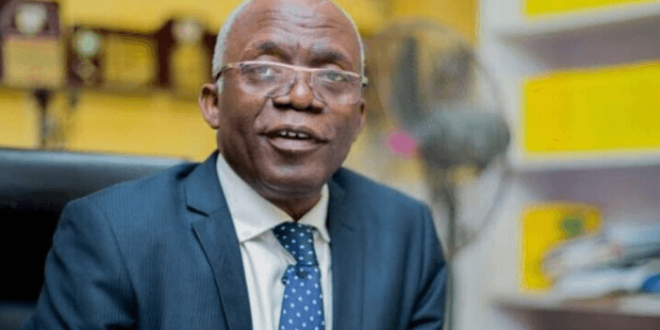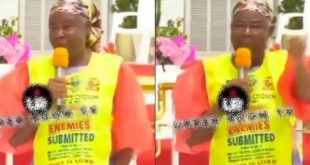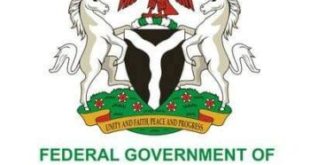A Senior Advocate of Nigeria and human rights activist, Femi Falana speaks with Seun Okinbaloye on Channels TV Politics Today programme where he talked about human rights issues amid the democratic dispensation of Nigeria, Local Government Autonomy, Minimum wage, among other issues. LILIAN EDWARD brings excerpts.
25 years since the return to democracy with President Bola Tinubu at the helm of affairs. What do you make of his address?
25 Years of uninterrupted civil rule. It is not yet democracy, we are still struggling to put democracy in place. I listened to the President’s speech and I was particularly moved when he praised the group of journalists for contributing to the struggle for the restoration of democracy in the country. But as a lawyer, I also became worried because right now some journalists are languishing in custody, defending a couple of them. Because they were alleged to have defended certain powerful people in the society. Me, I find this contradictory because by 1983 the second coming of the military. In the case of Arthur Nwankwo, incidentally, the President, you know, mentioned the name of Arthur Nwankwoas one of the heroes of democracy. In the case of Arthur Nwankwo and the state, the Court of Appeal took advantage of that case to annul seditious publications, the provisions of the criminal court relating to sedition. And the court made the point there that Nigerians must resist any attempt by the government to erode the democratic rights that Nigerians have fought for, particularly freedom of expression. That this was a law invoked by the colonial regime to silence Nigerians and that under a democratic government, that must not be allowed. And those in government, if they feel too irascible and intolerant of criticisms, should either block their ears with cotton wool or leave the government because criticism is indispensable in a democratic society. Happily, the government of the president did say that he appreciates the suffering of Nigerians, but that Nigerians should continue to exercise patience. This has been the language of the government for over 40 years. We are always told, there’ll be light at the end of the tunnel. But instead of things getting better for the masses of our people, things are getting tougher. And that is why the celebration of yesterday was by a tiny segment of the population, political office holders, but the majority of our people are wallowing in poverty. There’s nothing to celebrate. So next time that we are going to celebrate on June 12th day, Democracy Day, our people must be empowered. And we must start now to empower our people, economically and politically, and free them from detention. Allow the laws that have prohibited illegal arrest and illegal detention of citizens to work.
How would you describe the civil liberty and expression of freedom of expression under this government?
There is no basis for comparison concerning respect for civil liberties under a military junta and a civilian government. I did say this in Kaduna two days ago, when we had some of the best programmes line up for Democracy Day, whereby Governor Uba Sani released about 110 prisoners, I was invited to be part of the programme. And I did make the point. I am speaking for myself. I was jailed several times, and charged with all manners of offenses, including treasonable felony to overthrow a military dictator. But we were never convicted, and I did say that for the past 25 years, I have never been arrested or detained. Between 1987 and 1997, 10 years, I couldn’t travel to the airport. I had to travel to the bush. We call it the alternative route, which later, people call the NADECO route. We have been going through that route since 1987, whereas NADECO was formed in 1994. So you can’t compare. Severally, I was woken up in the night and taken away, sometimes for months. And there was a time when my son, FALz now, I had to ask the mother, we were told in school that only criminal suspects are arrested. Is my father a criminal suspect? My wife had to say no, the government arrests two types of people; criminals and those who are fighting against injustices under military dictators, and who are asking the military to leave us alone and allow democracy to be part of us. So I am not talking about, I am talking of excesses not permitted by law that are going on. That is a challenge for the government to walk its talk by ensuring through the Office of the Attorney-General that the police and security agencies in Nigeria are not allowed to erode the rights of our people as is the case now. We have gone a long way to banish illegal arrests instead of people arrested for civil wrongs. Obtaining a police permit to demonstrate, we have won the battle. What we are now saying is that the government must monitor the violations of our rights. The Police Establishment Act 2020 provides that every police station in Nigeria shall have a lawyer to monitor human rights enforcement compliance. So we need at least 5,000 lawyers to monitor human rights compliance in police stations. That has not been done. It is also stated in that police act that every Nigerian who is arrested, who has no lawyer, even in a police station, is entitled to demand a lawyer that will be supplied by the legal aid council. So Nigeria’s rights have been restored, granted by the government, and improved upon by the law. But we are saying in practice, daily, massive violations of the rights of our people take place. And the government doesn’t seem to appreciate that it must ensure that the rights of our people are respected. The government must appreciate that we are operating under a civilian dispensation and the terrorist practices of military dictators must not be allowed under a democratic dispensation.
Some federal lawmakers are already proposing a single six-year tenor for president and vice president, governors and deputy governors, and are also saying there should be two vice presidents, one for the south, one for the north. All of these efforts are to look at our structure. You are part of the 2014 Confab and are those who think that what we have presently is not working. What are your thoughts on those thinking?
Frankly speaking, those proposals are begging the question. And quite a number of the proponents have not addressed where we are coming from or what the challenges are. South Africa has just had an election. Quite several Nigerians who watched the election are challenging the type of elections we have in Nigeria. A case came up in the Supreme Court today (June 13), which is unnecessary. But what was the basis that the operators of the system are not allowing the local governments to function? Nineteen states have imposed caretaker committees to run local election systems in Nigeria. Contrary, local government councils. Contrary to section 71 of the constitution it stipulates that the system of local government in Nigeria shall be by democratically elected councils. Secondly, the money earmarked for the local government, by section 162 of the constitution, is being diverted. Opposition political parties no longer contest local government elections in Nigeria because the results are already known. And I am talking of all the states. Yet, the Supreme Court in no less than five cases has heard that no local government in Nigeria shall be run by a caretaker committee or a sole administrator. So, the guys in power are not allowing the system to work. So when they are now suggesting a six-year term, whatever, those are not the issues. Can we, can we conduct good elections? We had elections last year with a lot of challenges. Have we addressed them? Those are the issues. Section 17 of the constitution provides that the Revenue Mobilization, Allocation, and Fiscal Commission, shall feed the salaries and allowances of federal legislators. Is that what is going on in our country? Is there a provision for constituency projects in the constitution? Is padding of the budget permitted by law? Now, is there a provision for the exclusion of the people in talking about the dividends of democracy? What does the Constitution say? People are telling you, we want to pay wages that we like. Where is that done? In all capitalist countries, where you have a federal system of government, there must be a minimum wage. So that no employer of labour is permitted to pay a slave wage to a worker. That is just the benchmark. It does not prevent states from adding allowances according to their ability. But to say, you will allow an employer of labour in Nigeria to be, to pay 10,000 Naira or 35,000 Naira as some states are proposing is not permitted. And again, there is a mistake. Seun, when you are talking of a minimum wage, it does not mean a general salary review. A minimum wage is meant to blow up, show up the salary of the lowest-paid workers, and then when you move up, the percentage will decrease. But here, once you have a hundred percent increase in the salary of the lowest paid worker, you are now told that the salary of a permanent secretary must also be increased a hundred percent. You can only do that if you are talking of a general salary review. And I am sure that is why some state governments have said, we cannot pay 60,000 Naira. We cannot pay even 50,000 Naira. We want to pay 35,000 Naira. We want to pay 40,000 Naira. We must address the problems confronting our people. Problems of poverty, lack of education, lack of access to health, bad roads, and preventable diseases have rendered the lives of our people meaningless. But members of the elite, the political class can entertain themselves. And so, we now prefer a six-year tenure. You know, again, it’s like talking about state police. By 1979, what happened that the civilian government said, never again are we going to have state police. But we have local government police under the colonial regime and during the first republic. Why did they stop it? What was put in place? And what has been put in place is not allowed to work. We do not have a Federal Government police. What we have is a federation police to be controlled by the president, the 36 state governors, the IG, and the chairman police council. So, out of a 39-member council, the state governors have 36 members. So, by their share number, they should control that body. And what are the powers of the body? To administer, supervise, and organise the Nigerian police force. But because that body never meets, it doesn’t perform its constitutional duties, we are now talking of state police. Those who cannot pay minimum wage are going to have state police. So, you are going to harm people who will not be paid their salaries as they went due. So, we have to know where we are coming from and bring out suggestions that can improve the system and not suggestions that will take us years, almost to the colonial era. All those suggestions are begging the question of underdevelopment and lack of democracy.
There seems to be an alliance, being formed within the political class. It looks like politicians and the political elite are already getting and gearing up for the next round of elections. You have also advocated at some point in the past for a formidable political force that will give Nigerians what they deserve, with the benefit of hindsight and experience how do you think that the ruling party can be giving competition within the political space?
The military dictators impose on the country a constitution. They wanted Nigeria to run in their image, a powerful presidency to retain the residual power that was hijacked from the regions or the states. And the people in power have enjoyed the status quo since 1999. So at the end of the day, only those who are excluded, who are out there, are genuinely talking about political and electoral reforms. For those who are in, who prefer occasional amendment of the constitution, occasional alterations, not a holistic review of the constitution to have a constitution that can take care of the problems confronting the country, that can address the problems of poverty, that can address insecurity in the country and so on. So what you therefore have is a set of people, a political class that is so comfortable with the status quo. And when a demand for change arises, it’s all about dancing around the problems without really talking about alternatives. We are going to have elections in 2027, right? With the expense of last year, the members of the political class have not sat down to agree that never again are we going to have an election that will be so disputed, that we have so many cases in court, the largest number of cases in the world. Not talking of the enormous cost of conducting elections in our country, of prosecuting electoral petitions in the country. As we are moving towards 2027, the government should set a deadline of nine to 12 months so that the problems that were encountered last year will be addressed and there will be a law in place. And of course, those who messed up the last election, what does the law say? Can we have, apart from prosecuting election cases, and defending election petitions, can we now put in place a mechanism for dealing with electoral offenses? And finally, can we put in place a mechanism for ensuring that all election petitions are concluded before the inauguration of the incoming government? I think these are issues to address.
On the National minimum wage, the governors said the N62,000 is because some states may just not be able to meet their obligations.
From the information at my disposal, and I think this is in the public domain, some figures have been recommended to the president so that an executive bill can go to the national assembly for a new minimum wage in line with section 16, subsection IID of the constitution. We do not know the figure that has been recommended but for the governor, they are saying that they are not able to pay. I think the governor of Anambra State, Professor Soludo said that Nigeria is broke. Nigeria is broken by the system that we operate. Nigeria is made broke because the government relies heavily on the deleterious advice of the IMF and World Bank. And I am going to appeal to the governors here to look at what’s on the ground. The governments of Rivers State, I think that Governor Wike, another governor went to court. They approached the Federal High Court that out of the $62 billion owed the country by six IOCs (International Oil Companies) which the Federal Government does not want to collect, we are entitled to our share of the money. The federal court gave a judgment. The judgement was delivered by Justice Taiwo Taiwo to the effect that out of the $62 billion, that Akwa Ibom, Bayelsa, and Rivers, you are entitled to your share of the money. Other state governors should also challenge the Federal Government to give them their share of the money.
 National Telescope national telescope newspaper
National Telescope national telescope newspaper



